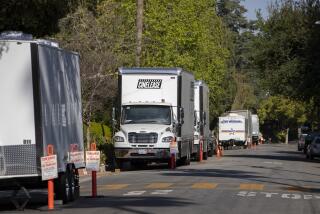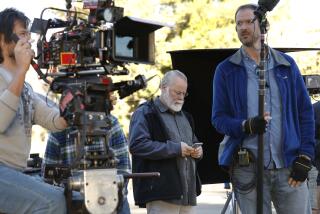Will studios profit from bad news about runaway production?
FilmL.A. produced another one of its gloomy reports on runaway production Thursday, this time looking at the 108 films released last year by the 11 leading studios. One of the most galling findings: More of those films had been shot in Louisiana than in the state that’s home to 10 of those studios (that would be California, in case you’ve forgotten).
Louisiana, really? That’s almost as bad as the Lakers getting stomped by the Pelicans.
What’s worse, as my colleague Richard Verrier reports, California’s share of big-budget films has shrunk dramatically. Of last year’s 25 releases with budgets larger than $100 million, California was the primary shooting locale for just two (count ‘em, 2). That’s compared to 16 out of 25 in 1997, back before the “Pied Piper of tax credits” started luring filmmakers away from the Golden State.
Numbers like these are the inspiration behind a bill by Assemblymen Mike Gatto (D-Los Angeles) and Raul Bocanegra (D-Pacoima) to up the ante on California’s tax breaks for film and TV producers. The measure would allow tax credits on up to $100 million in qualified expenditures by filmmakers in California; the current credits are available only for films with budgets under $75 million. The total price tag of the bill has yet to be determined, but Verrier reported last month that industry lobbyists were pushing the state to pony up something close to New York’s total of $420 million annually, or four times the current amount.
Of course they are! The question is, why are legislators playing along instead of howling?
The studios really have states over a barrel here. Their manufacturing process is remarkably portable, and getting more so by the day. Much of the work could be done in any number of places, meaning they can pick the locale that offers the best financial terms. Countries or states that had little or no film or TV production could offer enormous tax breaks under the theory that any business they brought in would be a plus for the economy, generating more sales for local businesses and (temporary) jobs for local workers. Places like California with well-established film industries were hard-pressed to follow suit at first, fearing that they would just be subsidizing filmmakers that were going to work in the state anyway. But the more movie and TV shoots and productions jobs that the state lost to the likes of Louisiana, the more pressure it came under to offer tax breaks in equal measure.
Filmmakers aren’t exactly begging Sacramento for favors. They’re just telling lawmakers that they’ll take their productions somewhere else unless the state agrees to cover some of their costs through tax credits and other incentives. They win either way.
Why haven’t other industries adopted the same approach? Well, some have. Look at the deals automakers have been striking since foreign car brands started building factories in the United States.
But few are in the position that the studios are, capable of making their product in what amounts to a pop-up factory in whatever location suits them. That gives them unparalleled leverage when dealing with state officials, which is why so many public dollars are being spent to help make products that may temporarily inject beauty, humor or drama into their constituents’ lives, but are hardly essential to them.
ALSO:
How the West is losing Ukraine
Will L.A. really be Alec Baldwin’s kind of town?
Why is Gov. Moonbeam so afraid of legalized marijuana?
Follow Jon Healey on Twitter @jcahealey and Google+
More to Read
A cure for the common opinion
Get thought-provoking perspectives with our weekly newsletter.
You may occasionally receive promotional content from the Los Angeles Times.







